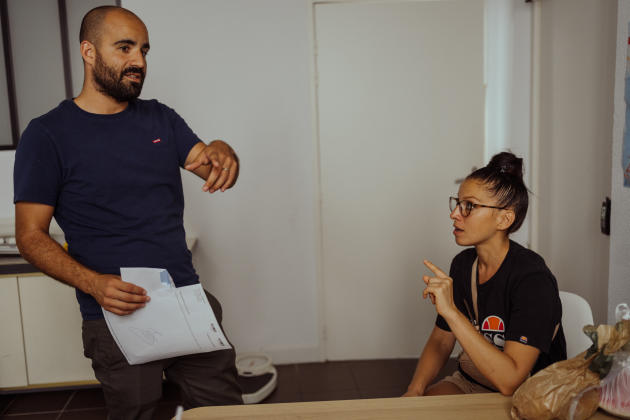In the middle of the conversation, Aissata flinches. Adama, for her part, several times almost drops her 2-month-old baby, a big baby swaddled in a white bodysuit, whom she is breastfeeding the absent gaze. Perry’s eyes blur: she has seen too much violence. Fanta’s eyes have become glassy: she is there, but not really there anymore. Grace regrets her dry eyes, she would love to cry and scream, maybe someone would believe her and help her more, but she doesn’t know where her tears have gone. Nadia smiles, pointing to the cigarette burn scars that dotted her chest, as if to apologize for this life that caused her to end up here. Stella wears her sunglasses inside, and bursts out laughing as she recounts how she was sold four times.
All these details, these marks of barbarity inscribed in the bodies of migrant women, Doctor Jérémy Khouani has observed them since his medical studies. General practitioner in a health home in 3e district of Marseille – with 55% of its inhabitants below the poverty line, it is one of the poorest places in France – he treats aches and pains, sore throats and gastrointestinal illnesses, but above all sees the trauma arise when faced with the words “excision”, “Libya”, “trafficking” or “rape” .
Upset by consultations which lead him to measure the size of post-excision vaginal lips for the French Office for the Protection of Refugees and Stateless Persons (Ofpra), to diagnose massive osteoarthritis in a 30-year-old young woman or to prescribe antidepressants to another who has just tried to immolate himself, he decided to fight with what he knew how to do: ” Science “. “I don’t want to rank things, but the violence suffered by women asylum seekers is three times more horrible than men. They also experience violence, but it is not systemic, they do not have a mutilated vagina at age 6, or rape as an almost inevitable part of migration. » In Europe, in 2021, women represent 31% of asylum seekers.
Three years ago, with the Assistance publique-Hôpitaux de Marseille and the faculty of medicine of Aix-Marseille, Jérémy Khouani launched a major public health survey to measure the incidence of sexual violence among women seeking asylum in France. A new study, published this Monday, September 18 in the scientific journal The Lancet (Regional Health Europe) and carried out on 273 women who arrived on French territory, volunteered to participate and were awaiting a response from the authorities regarding their status. Half of them come from West Africa, the rest from the Middle East, Asia or Europe.
You have 87.17% of this article left to read. The rest is reserved for subscribers.
